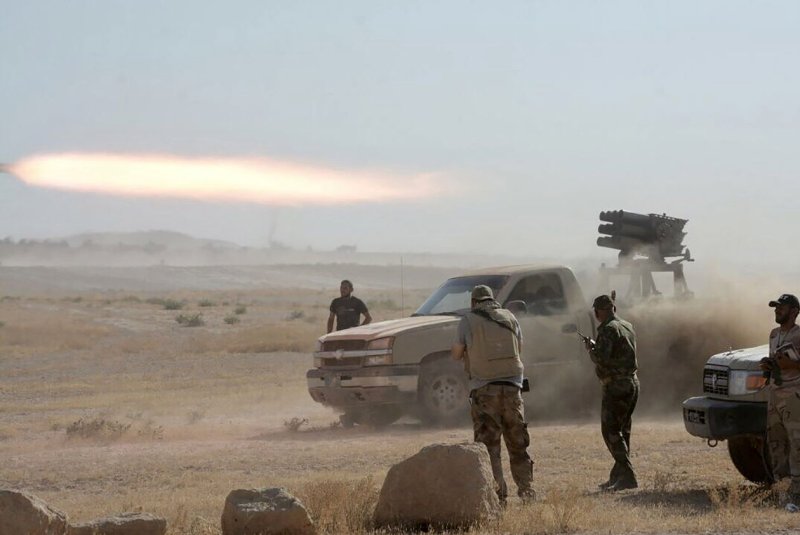Iraqi troops, backed by Shiite fighters from the Popular Mobilization Forces, fire toward jihadist positions in eastern Tal Afar, Iraq, on August 26, 2017. Iraqi forces, backed by local militia and a U.S.-led coalition, liberated Tel Afar a month after taking control of Mosul from Islamic State fighters. File Photo by Ali Bayaty/UPI |
License Photo
Nov. 18 (UPI) -- The Iranian government waged a secret war against the Islamic State in neighboring Iraq for years -- spying, providing aid to the group's enemies and scheming to break alliances with other insurgent factions, a trove of leaked documents show.
The New York Times and The Intercept reported 700 pages of the documents from Iranian intelligence and security officers in 2014 and 2015, which they say show Iran intended to use Iraq as a "gateway for Iranian power" from Syria to Lebanon. Iran is creating its own Revolutionary Guard in Iraq called the Popular Mobilization Units, the reports said.
The documents detail how Iran cultivated partnerships with Sunni and Kurdish groups to fight the terror group, and how Iran actively worked to recruit disaffected terrorists who'd defected.
"The Americans' insistence on not cooperating with Iran in the war against ISIS and not participating in the meetings of the 10 countries of the region -- the Arabs and Turkey -- as well as the Western and Arab countries' extreme positions on the presence and role of Iran in Iraq has had a negative influence," one document states.
The records say the United States supported Iranian-backed Shi'ite Nouri al-Maliki as Iraqi prime minister and his replacement, Haider al-Abadi. The moves by the Obama administration, they say, grew Iranian influence in Iraq.
The documents also show Iran sought to learn the United States' plans for Iraq and intended to plant a spy in the U.S. State Department. Tehran eyed former CIA assets who'd been discarded by the United States for that purpose, the Times and Intercept reports said.
By 2014 and 2015, the records say, Iran had already infiltrated many of Iraq's institutions with people loyal to Tehran. The clandestine operations found some success, but the documents indicate Iran became too bold with its influence in Iraq and ultimately fueled violent protests that have killed hundreds of Iraqis in recent months.
The documents also note the influence of U.S. President Donald Trump, who abandoned the Obama-era nuclear deal and reimposed a spate of sanctions against Tehran. Iran has since increased uranium production to levels that violate the 2015 pact.















